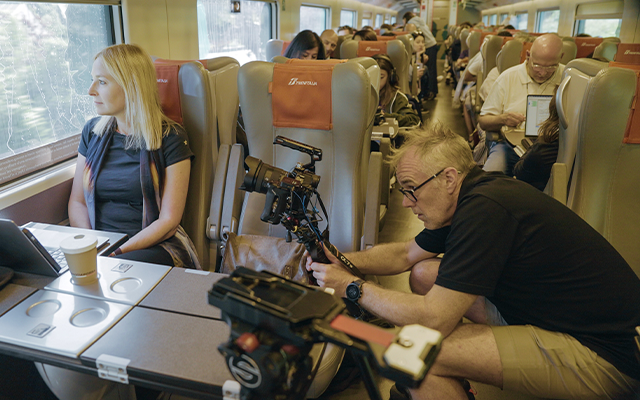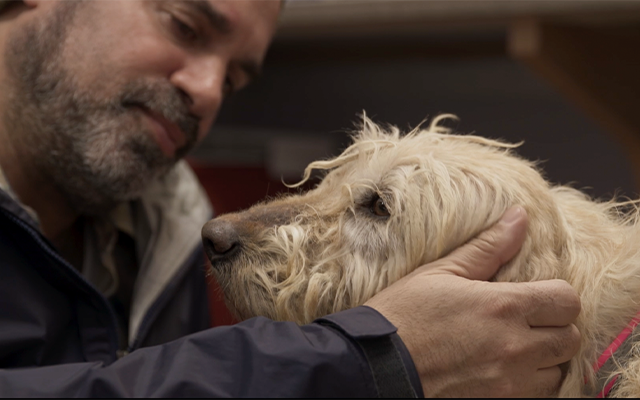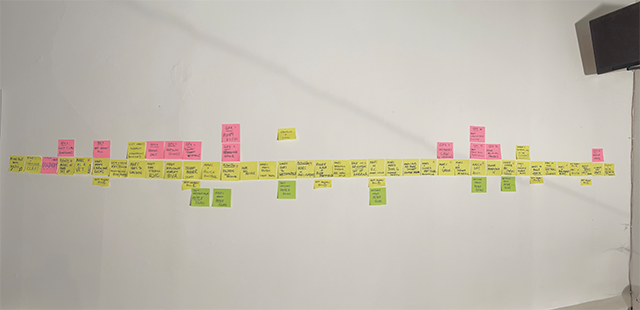Across the globe dogs are victim to abuse and exploitation through the cruel puppy mill industry, operating under our very noses.
Dogspiracy follows British vet, author and animal welfare campaigner Dr Marc Abraham OBE as he investigates the puppy mills industry and uncovers a conspiracy that prevents bipartisan laws to protect dogs from being passed.
We spoke to director Paul Crompton about how the project came about, telling a story about animal cruelty without showing any suffering, and why finding the right contributor is so important for your documentary.

Dogspiracy started out as a very different project. Can you talk us through its origins?
In the first month of lockdown a production company from Prague (DONART) got in touch with me about making an archive-based documentary looking at the royal family’s longstanding relationship with dogs. A film totally driven by the archive was the only option we had in that early period of the pandemic. I teamed up with my colleague Jim Nally and we set about writing what would have been “Royal Dogs”.
Whilst researching, when we looked at the modern royals we found that Megan Markle had got her pet dog from a rescue centre. The more Jim and I looked into rescue dogs the more we thought there is a very different film to be made. Marc Abraham’s name kept cropping up in our research and so I went to meet with him alongside DONART Executive Producer Jiri Tucek. After an hour we both realised that we needed Marc for the film. He knew all the politicians, he runs the All-Party Parliamentary Dog Advisory Welfare Group (APDAWG), and his knowledge of the laws in the US and the UK was incredible. The timing was perfect, as Marc had friends in Pennsylvania who wanted his help campaigning for an upcoming welfare bill. “Royal Dogs” was put on ice and work on Dogspiracy began.
What sort of access did working with Marc give you?
Marc just seemed to know everybody, from politicians to charity heads, to all kinds of organisations connected to dogs, and plenty of celebs too. His circle was essential to driving Lucy’s Law (an important dog welfare bill) through UK Parliament — which took 10 years. We asked over 30 people and organisations to be in the documentary, and out of that only two rejected our requests.
Gaining the trust of our contributors was never an issue as it came with Marc’s presence. Before he came onboard I was calling rescue centres, MPs, and charities, and not getting very far. Marc was one phone call away from all of them, and everyone he asked to interview simply said yes. That’s such a rarity.

Whilst we’ve had some progress in the UK with the passing of Lucy’s Law, there’s still work to be done in the US. How did you decide how to end the film, whilst the story is still ongoing?
My original plan was to conclude the film with the Pennsylvania state government taking a vote on the crucial dog welfare bill, Victoria’s Law (Similar to Lucy’s Law that Marc worked on in the UK).
The planned vote kept mysteriously stalling. Rather than depending on the political timetable, which was proving unreliable, we decided that the film should be a source of public information — letting audiences know the most ethical way to buy a dog and avoid unwittingly supporting the puppy mill industry.
Three years later and the law has still not been scheduled. So, the film concludes (spoiler alert) by saying if the public can do the right thing, and buy a dog in the right way, then these laws wouldn’t be required.
What was your experience like in the edit?
The edit lasted about a year, in the basement of a 70s Soviet tower block on the outskirts of Prague. Incidentally the audio dub was done in a former Communist Party screening room used for censoring films from the West. I spent a lot of time in Prague, but when I couldn’t be there the editor, Michal Novák, and I would swap notes on Facetime. It was a great experience but there was a huge amount of material. I started with a storyboard on his wall using post-it notes, which he tells me is still there. Then we’d edit some scenes and walk back to the post it notes and talk, a lot.

It was important that the film feels like an adventure, that Marc is a man on a mission. It’s a classic observational documentary in many ways. I’ve worked a lot with top-notch documentary editors over the years and the phrase “actuality is gold” has been said on many occasions. Actuality brings a rawness and a good level of energy.
We had two charities working with us, Four Paws in the UK and Humane Society in the US, who would go out and film their members going undercover in pet stores and puppy mills. They supplied hours of footage, so selecting shots from that was challenging. We were all adamant that suffering dogs were not featured in the film, but we needed to show what life in a puppy mill is like. That was tough, but it ultimately made me focus the film more on the brilliant people who work tirelessly for animal welfare. In the end there isn’t that much suffering at all in the film.
The decision to frame the film as a source of public information has fed right into the way the film is being distributed. It’s still early days, but do you think framing the film in this way has allowed audiences to connect to the story on a deeper, more hopeful, level?
Yes. Finishing the film after almost five years in December 2024 was a great relief, but in the independent film world that’s the equivalent of half time in a game of football. We have two brilliant distributors, one for the UK (Bulldog Film Distribution) and one for the rest of the world (Blue Eyes Film), and they are both doing a brilliant job. But it’s a competitive and crowded marketplace for independent documentaries so we all have to do our bit, whether it’s word of mouth, doing press and radio, or badgering people who are famous.
Some of the screenings we have lined up in the UK will be linked with local dog rescue centres, which means that they get some awareness and will join us on stage for a Q&A. We will also get their supporters coming to see the film.
The audience we’ve had so far have been really active on social media, and some are well known from TV and politics. They have a good following and are trusted voices on these issues.
Do you have any upcoming projects that you’d like to share?
I’m working on a travel series with Alice Roberts on the Roman Empire, a Stone Roses / Manchester music doc that looks at the year 1990 with a story that pivots on the legendary Spike Island gig. I'm also an Exec on a feature doc that spent a year behind the scenes at a new newspaper, the Baltimore Banner. It is a new type of business model with the sole aim of putting old-school journalism back on the local frontline.






Have Your Say
Join the discussion on Facebook